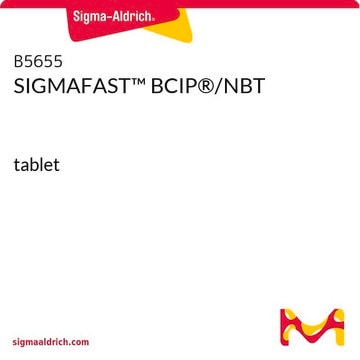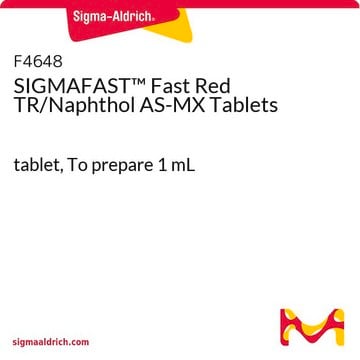Összes fotó(1)
Fontos dokumentumok
11681460001
Roche
INT/BCIP Stock Solution
solution, pkg of 3 mL
Szinonimák:
5-bromo-4-chloro-3-indoyl phosphate, BCIP
Bejelentkezésa Szervezeti és Szerződéses árazás megtekintéséhez
Összes fotó(1)
About This Item
UNSPSC kód:
12352204
Javasolt termékek
Forma
solution
molekulatömeg
(INT: Mr = 505.7; BCIP toluidine salt: Mr = 433.6)
kiszerelés
pkg of 3 mL
gyártó/kereskedő neve
Roche
tárolási hőmérséklet
2-8°C
Általános leírás
BCIP (5-bromo-4-chloro-3-indoyl phosphate) is the AP (alkaline phosphatase)-substrate which after dephosphorylation reacts further to give a dark-blue indigo dye as an oxidation product. INT (iodonitrotetrazolium) is the oxidant producing a red dye. The reaction product has a reddish-brown color and is insoluble in water.
Alkalmazás
INT/BCIP Stock Solution is used for the sensitive detection of alkaline phosphatase (AP) in blotting protocols, that includes:
- Southern blot
- Western blot
- immunohistochemistry and immunocytochemistry
Specifikációk
Formulas: INT: C19H13CIN5O2; BCIP: C8H6NO4BrCIP x C7H9N
Elv
BCIP is the AP-substrate which after dephosphorylation reacts further to give a dark-blue indigo dye as an oxidation product. INT is the oxidant producing a red dye.
Fizikai forma
Solution of 33 mg/ml INT (2-[4-iodophenyl]-3-[4-nitrophenyl]-5-phenyltetrazolium chloride) and 33 mg/ml BCIP (5-bromo-4-chloro-3-indolyl-phosphate, toluidine-salt in DMSO)
Elkészítési megjegyzés
Working solution: Preparation of 10 ml Staining Solution
Bring the stock solution to 15 to 25 °C until all components are dissolved.
Add 75 μl of the stock solution to 10 ml 0.1 M Tris-buffer, pH 9.5, 0.05 M MgCl2, 0.1 M NaCl.
Note: Prepare the staining solution shortly before use.
Preparation of Additional Solutions Required
Blocking solution: Dissolve 0.5 g Blocking Reagent in 100 ml TBS, pH 7.5, by heating to 50 to 60 °C (1 hour). Dissolving the components can be accelerated by sonication or by incubation in a microwave oven.
Information Note: The solution remains turbid.
Bring the stock solution to 15 to 25 °C until all components are dissolved.
Add 75 μl of the stock solution to 10 ml 0.1 M Tris-buffer, pH 9.5, 0.05 M MgCl2, 0.1 M NaCl.
Note: Prepare the staining solution shortly before use.
Preparation of Additional Solutions Required
Blocking solution: Dissolve 0.5 g Blocking Reagent in 100 ml TBS, pH 7.5, by heating to 50 to 60 °C (1 hour). Dissolving the components can be accelerated by sonication or by incubation in a microwave oven.
Information Note: The solution remains turbid.
Egyéb megjegyzések
For life science research only. Not for use in diagnostic procedures.
Tárolási osztály kódja
12 - Non Combustible Liquids
WGK
WGK 2
Lobbanási pont (F)
does not flash
Lobbanási pont (C)
does not flash
Válasszon a legfrissebb verziók közül:
Már rendelkezik ezzel a termékkel?
Az Ön által nemrégiben megvásárolt termékekre vonatkozó dokumentumokat a Dokumentumtárban találja.
Az ügyfelek ezeket is megtekintették
Rahul Satija et al.
Nature biotechnology, 33(5), 495-502 (2015-04-14)
Spatial localization is a key determinant of cellular fate and behavior, but methods for spatially resolved, transcriptome-wide gene expression profiling across complex tissues are lacking. RNA staining methods assay only a small number of transcripts, whereas single-cell RNA-seq, which measures
Practical Methods in Cardiovascular Research
Dhein S
Springer Science & Business Media (2006)
Peichao Li et al.
Carcinogenesis, 42(1), 136-147 (2020-07-28)
Hexavalent chromium [Cr(VI)] is a potent human lung carcinogen. Multiple mechanisms have been proposed that contribute to Cr(VI)-induced lung carcinogenesis including oxidative stress, DNA damage, genomic instability and epigenetic modulation. However, the molecular mechanisms and pathways mediating Cr(VI) carcinogenicity have
Anna-Carina Weiss et al.
Development (Cambridge, England), 141(17), 3420-3430 (2014-08-21)
The vesico-ureteric junction (VUJ) forms through a complex developmental program that connects the primordium of the upper urinary tract [the nephric duct (ND)] with that of the lower urinary tract (the cloaca). The signals that orchestrate the various tissue interactions
Federico Tessadori et al.
eLife, 10 (2021-08-11)
Organ laterality refers to the left-right asymmetry in disposition and conformation of internal organs and is established during embryogenesis. The heart is the first organ to display visible left-right asymmetries through its left-sided positioning and rightward looping. Here, we present
Tudóscsoportunk valamennyi kutatási területen rendelkezik tapasztalattal, beleértve az élettudományt, az anyagtudományt, a kémiai szintézist, a kromatográfiát, az analitikát és még sok más területet.
Lépjen kapcsolatba a szaktanácsadással









